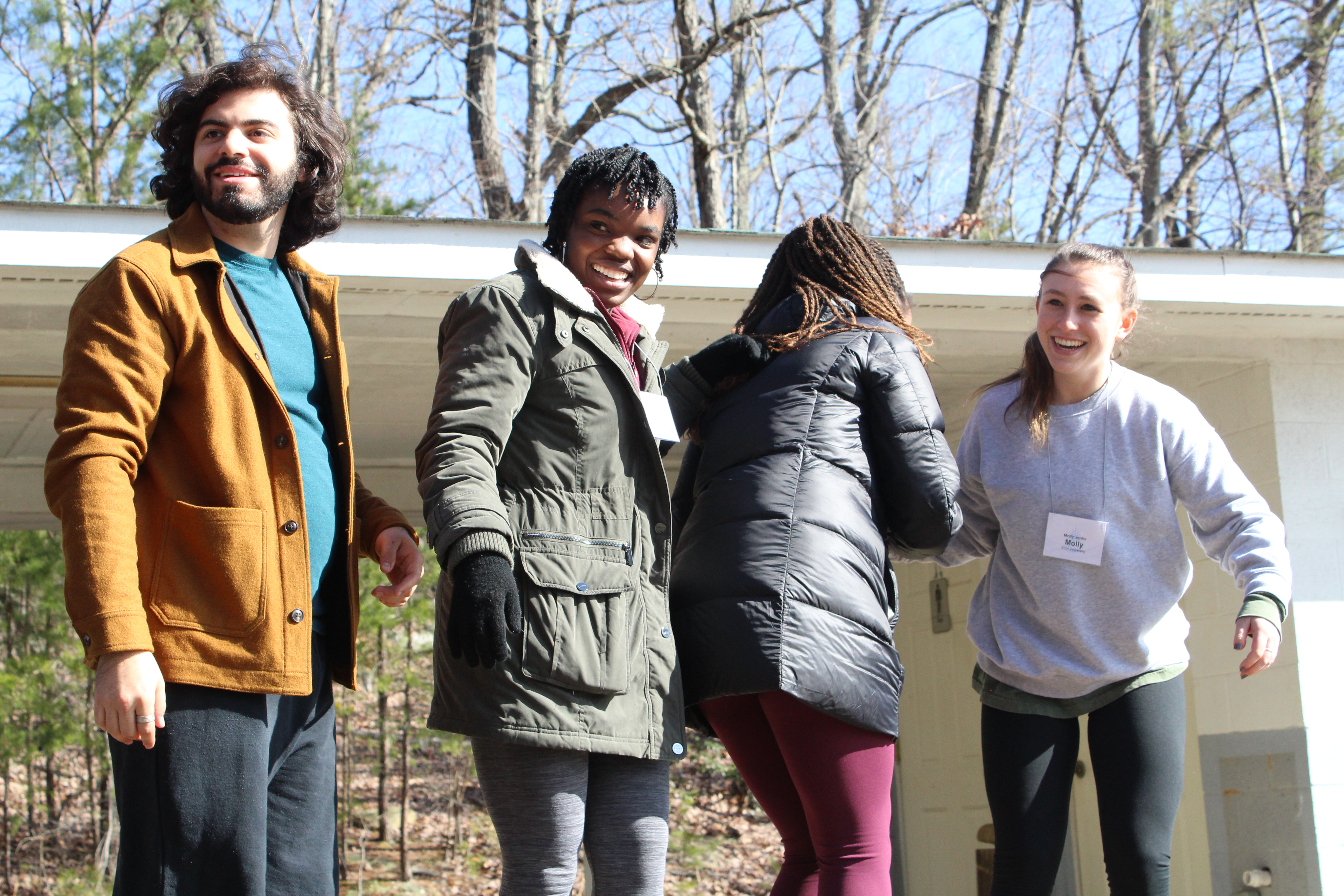A healthy disregard for the impossible - a phrase that is the foundation for the curriculum of the LeaderShape Institute. LeaderShape is an organization dedicated to creating a just, caring and thriving world where all lead with integrity. This past Fake Break took Elon students on the LeaderShape journey, a first in Elon University’s history.
“A healthy disregard for the impossible.” It’s a phrase that is the foundation for the curriculum of the LeaderShape Institute.
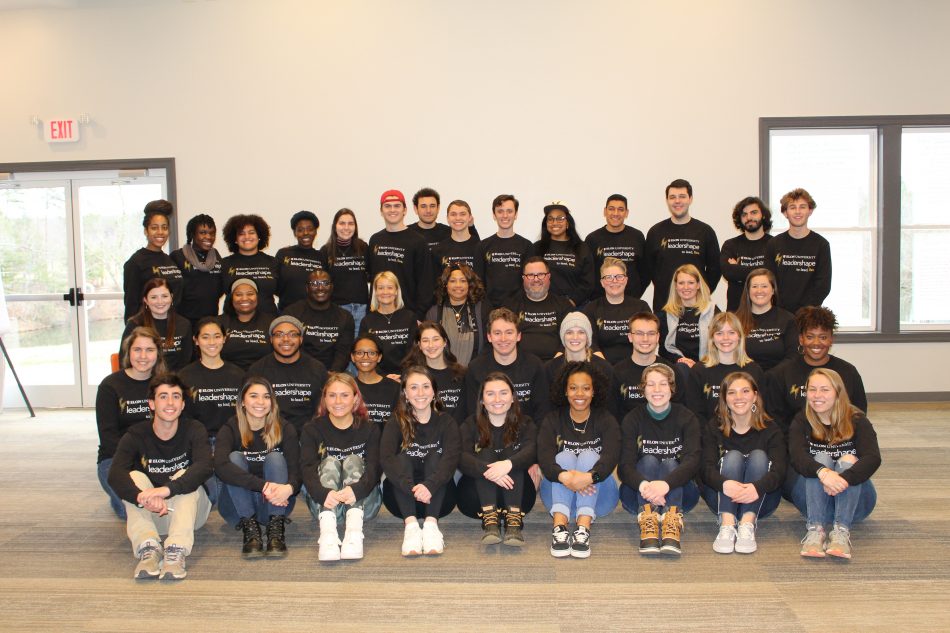
LeaderShape is an organization dedicated to creating a just, caring and thriving world where all lead with integrity. For more than 30 years, LeaderShape has worked to do this by having conversations that matter. The Institute challenges students to lead with integrity while working towards a vision grounded in their deepest values. Participants explore not only what they want to do, but who they want to be in a dynamic six-day experience intended to produce a breakthrough in the leadership capacity of participants.
This year Elon students on the LeaderShape journey, a first in Elon University’s history. Elon sent 33 students and seven staff members to the Institute from Jan. 25 through 30 where they were able to develop personal leadership and visions for a better future.
LeaderShape participant Noah Jordan ’23 wanted to do LeaderShape to develop his leadership and relationships on campus. “I wanted to get more of an idea of how to become a better leader, and how I can use my leadership skills on the Elon campus,” Jordan said. “I was definitely looking forward to meeting new people,new kids and faculty. I was really excited to build connections and relationships.”
The group arrived at Camp Hanes in King, North Carolina, on Jan. 25.
LeaderShape’s curriculum is a mixture of lectures, simulations and small-group discussions. The small groups were named family cluster, made up of five to six students and one facilitator.
Harry Titus, assistant director for student care and outreach, described his time as a facilitator in the family clusters.
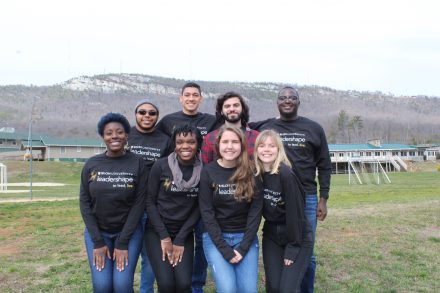
“I think that the conversations we were able to have in our family clusters were so genuine and so impactful,” Titus said. “It was really a space for us to be open and honest with each other.”
Along with Titus, four other Elon staff served as facilitators, including Community Director for the East Neighborhood Sylvia Wade, Senior Associate Director of Career Services for the School of Communications Ross Wade, Director of New Student and Transitions Programs Emily Krechel and Associate Director of Annual Giving Chandler Thompson. Dana Pursley, associate director of the Center for Leadership and Lauren Luther, senior and executive intern, coordinated the Institute.
Day One of LeaderShape focused on building community between students. Time was spent thinking about the definition of leadership and introducing family clusters to each other. The day was wrapped up with a final reflection in the large group.
Titus highlighted the community’s relationship and feel from this day, which set the tone for the rest of the week.
“It was an inclusive environment that made everyone feel like they needed to be there, and it was great that folks wanted to be there.” Titus said.
Day Two of LeaderShape took participants on a journey to realize “the value of one, the power of all”. The morning was split between indoor challenges and an outdoor rope course, where students had to work together to complete an entire vision.
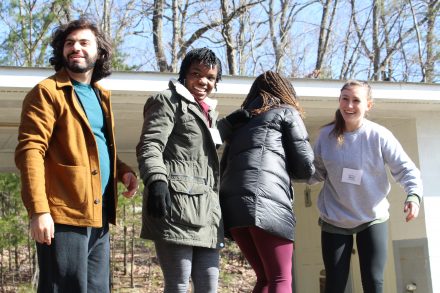
Jordan described how interactive parts of LeaderShape challenged participants.
“We were all trying to achieve the same goal of mutual respect and leadership,” Jordan said. “Though it may have been difficult throughout the challenges and simulations, it was super helpful for us to grow.”
After lunch, the focus turned to equity and empathy in leadership and what that means in leadership development. Participants took the DISC Personal Development Profile, which gave them a starting point to see how they approached leadership in different settings.
Day Three introduced the action of “Challenging What Is, Looking to What Could Be”. Students and Faculty started the day building balloon castles in their family clusters, which flowed into having afinal vision for the future.
Students were given time to develop a vision for the world that they wanted to enact through their leadership at Elon. They wrote headlines for their visions along with a paragraph about how the world would be once their vision happened.
“LeaderShape had the vision project which taught us to reach for a goal down the road” Jordan said. “Then it helped us go through the steps we needed to get there.”
That evening the participants were able to engage with a panel of leaders that were connected with Elon University. The panel included President Connie Ledoux Book, Eric Cunningham ‘19, L ‘21 and Michael DeStefano P ‘21.
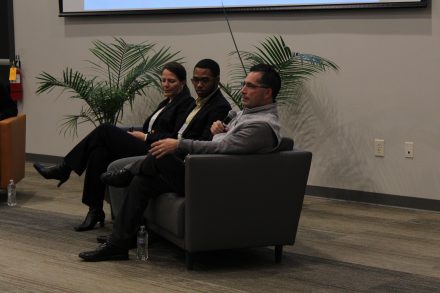
Cunningham participated in the Elon community in several prominent leadership roles before graduating from Elon in 2019. DeStefano is a member of the Love School of Business Board, and has had a unique leadership journey through his experience at Ernst & Young.
Other guests that attended the panel were Vice President of Student Life Jon Dooley, Dean of Student Development Jodean Schmiederer and Tom Brinkley, executive director of the Student Professional Development Center. Guests arrived early to read and comment on the student visions on display. Guests were able to personally speak with participants at dinner.
Passing the halfway mark, Day Four introduced how to bring a vision to reality. Participants took their visions into their family clusters, where their family offered ideas and inspiration to break the vision down into feasible steps.
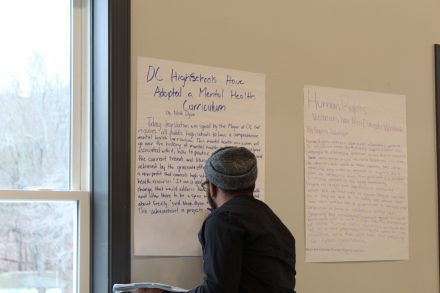
Titus explained how this process helped create accountability for visions and reaching those goals.
“You have folks that are looking at you that can say ‘hey, I remember a part of your vision was x,y,z. Here’s your opportunity, are you going to actually uphold to that vision’,” Titus said.
The ideas and steps that were offered aided students in creating a blueprint for their vision, breaking it down into smaller goals that fed into a larger idea.
Day Four was finished with a simulation that shined a light on the relationship between power and influence in society, covering heavy topics that lead into a group reflection on the real world.
Titus shared how the simulation left an impact on him.
“I think what really stood out to me was watching sort of this liberation, or this lightbulb click,” Titus said. “And a lot of folks never had to think about the privileges that they carry, or how sometimes our privileges hinder others.”
The group split into the family clusters after the simulation to unpack the realizations and how they would impact individual leadership and visions.
Day Five began to apply the lessons of the week to living and leading with integrity. This theme hit on who participants wanted to be as leaders, and how they could encourage the leadership of others.
Jordan shared his own leadership definition as “doing what’s right when no one is looking, and staying true to yourself.”
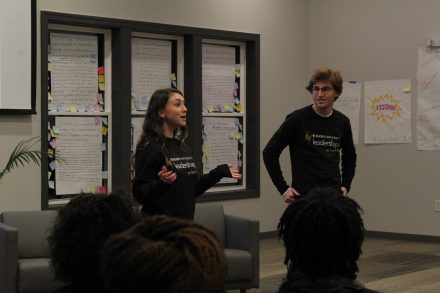
Now armed with individual leadership definitions, visions and motivation to change the world, participants were able to split into groups to discuss burning issues at Elon University. This allowed them to talk about how they wanted to back and impact campus.
“Back at Elon, others don’t really know what we went through,” Jordan said. “I mean, it’s like my responsibility to share the wealth and spread the ideas of LeaderShape.”
The LeaderShape faculty began to introduce ideas on how to stay in action after LeaderShape commenced and encouraged students to think about it for the rest of their time at Elon and beyond.
Day Six took a deeper dive into saying in action, wrapping the experience up with a commencement ceremony and preparation for Day Seven.
Day Seven is the idea that it is the rest of the participants’ lives. After leaving LeadeShape, students are expected to carry on with the lessons and ideas from the program, which would contribute to their Day Seven.
Titus saw LeaderShape as an opportunity to see other forms of leadership in the students attending.
“We are all leaders in our own way, and the week of LeaderShape really allowed me to watch folks lead from their own capacities,” Titus said. “Whether that was being the most vocal, taking the lead or sitting in the back and leading by doing.
LeaderShape participants are continuing their relationships back on campus, both as the larger learning community and within their family clusters.
Jordan sees the relationships he made as ones that will last a lifetime.
“I talked to people I never would have spoken to otherwise,” Jordan said. “LeaderShape forms lifelong friendships, and shows a lot of valuable lessons.”
Both Jordan and Titus encourage students and faculty to get involved with LeaderShape.
“Just go for it, and allow yourself to truly be engulfed in this week of amazing things,” Titus said.
LeaderShape has shaped some of Elon’s leaders for the better, and hopefully will continue to do so in the future.
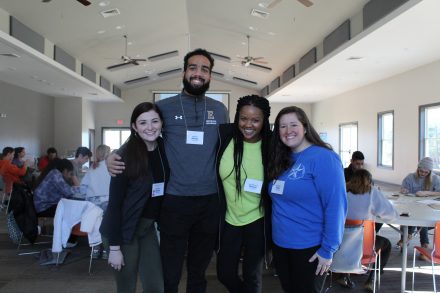
Visit the Center for Leadership website for more information on LeaderShape. For a deeper look into LeaderShape at Elon in 2020, take a look at this video by participant Tiffany Huang



